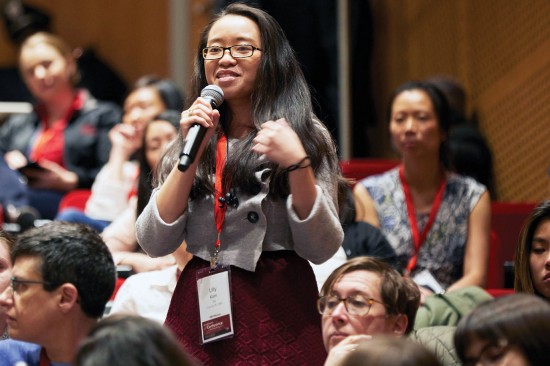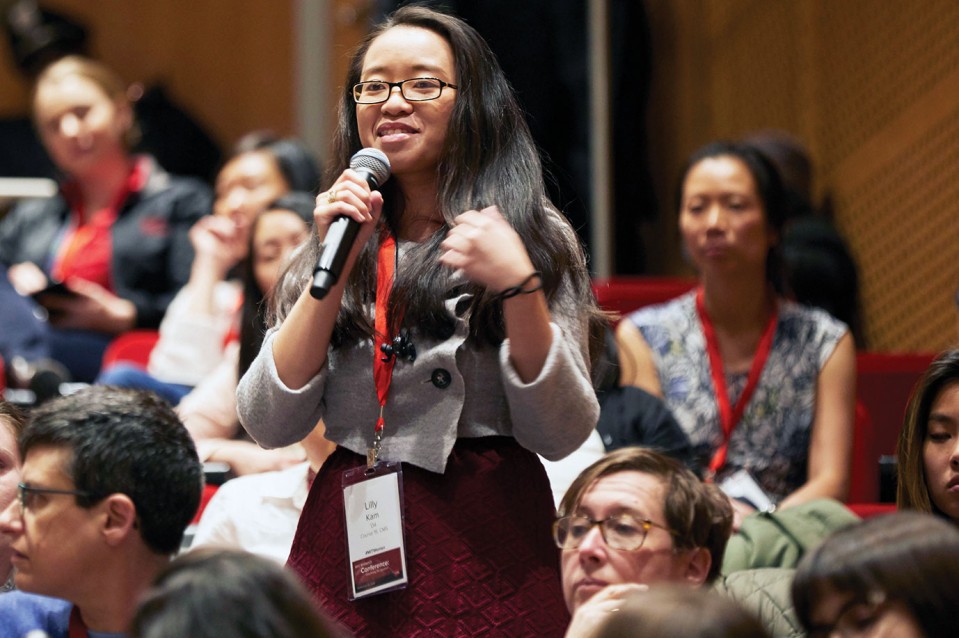MIT women unite at unConference
MIT women foster change and create connections at campus event.



It’s through our shared empathy and action that we can change the world,” says Paige Parsons ’90, one of the 75 alumnae who spoke at the MIT Women’s unConference: Completing the Equation, held on campus March 9–10. Through inspirational talks, story sharing, and sound advice, MIT women worked to help each other transform their lives, careers, and industries.
The event was sold out, with nearly 350 registrants from 29 states, six countries, and 31 courses, including current MIT students and graduates spanning seven decades. In addition to participants who gathered in Cambridge, 280 tuned in virtually to watch a live stream of the keynotes. More than 300 MITx learners were also in the mix, either on campus or online.
Why an unConference? In a year that has been momentous for women in the US and worldwide—with the #metoo and Time’s Up movements that address sexual assault, sexual harassment, and workplace inequality—the goal was to give MIT alumnae a platform.
The conference format allowed attendees to submit panel ideas and then vote on their favorites. The result was eight panels with titles including “Why Don’t Women Speak Up” and “Non-Traditional Career Trajectories.” Each was facilitated by alumnae speakers but quickly became an interactive conversation between panelists and audience.
In the opening keynote, Sara Seager, MIT professor of physics and planetary science, shared her research on exoplanets as well as stories about her personal challenges in motherhood, marriage, and friendship.
“I wouldn’t be where I am without MIT,” said Seager, one of Time magazine’s 25 most influential people in space in 2017. Seager came to MIT in 2007 proposing research that others would have turned down, she said: “To the outside it may be a no, but to MIT it’s a yes.” She recounted her journey as a single parent working at MIT after her husband died; MIT gave her the funding, resources, and support to help her succeed. “I just hadn’t anticipated that I could find extended family amongst my MIT people,” she said, “and I was so grateful for their friendship.”
On Saturday at a panel on “productive aggressiveness,” attendees were urged to be unorthodox but also connect with the right people. The speakers acknowledged that many MIT alumni—including themselves—don’t enjoy networking. “Networking is hard,” said Lindsay Androski Kelly ’98. “Just focus on asking questions and listening to people. Everyone has interesting stories to tell.”
The unConference also included workshops on storytelling, overcoming financial stumbling blocks, and achieving work-life balance; a job expo; an “unhangout”; a startup competition; and a research competition.
The closing keynote featured Tamika Mallory, activist and Women’s March cochair, who stressed the importance of women standing together.
“We have to be able to build this bridge and bring everyone to the table to make change,” said Mallory, who described the challenges in working with diverse groups for the Women’s March in 2017. The march brought together five million people in protest and solidarity, an effort aimed at creating a more just and equitable world.
“Too many times, we look at fighting a specific person and target our anger,” Mallory said. “But then we are ignoring the greater societal issues.”